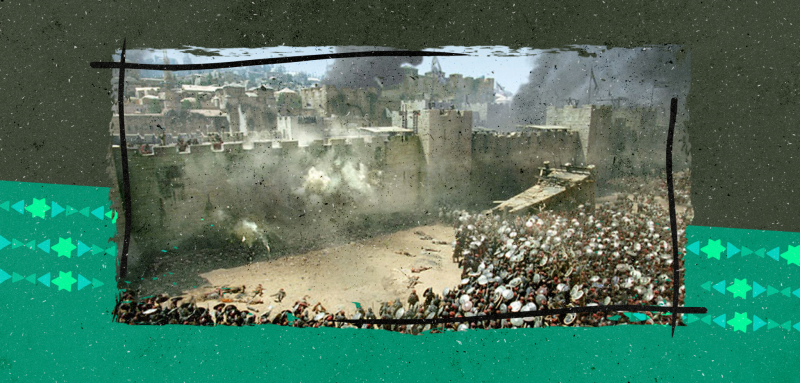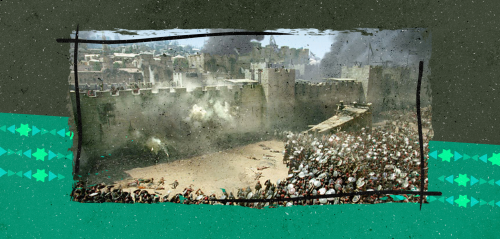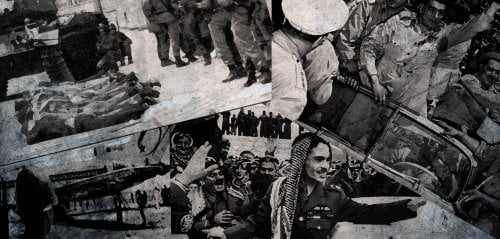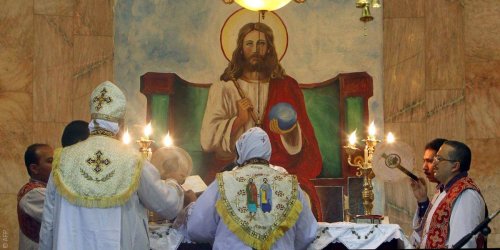After the fall of the last Umayyad caliph in Egypt, Marwan ibn Muhammad (72-132 AH/691-750 CE), Egyptians hoped for an end to the oppression they had endured due to the political and social conditions during the Umayyad era. However, over time it became clear that these were mere dreams. With the beginning of Abbasid rule, Egypt witnessed its first popular revolution led by peasants and Copts. The revolution continued until the caliph al-Ma'mun came from Baghdad to Cairo, and suppressed it.
The first popular revolution in Egypt
Details of this revolution were mentioned by Abu al-Abbas al-Maqrizi in his book "Al-Mawa'iz wal-I'tibar bi Dhikr al-Khutat wal-Athar", explaining that in Jumada al-Awwal of the year 216 AH, the entire land and the Arabs and Copts of the country rose up and expelled the workers, defying the authority due to the treatment of the Sultan's workers. This led to multiple wars between them and the troops of the Egyptian city of Fustat.
However, it appears that there was another reason for the anger of the citizens: the heavy taxation. This was indicated by Severus ibn al-Muqaffaʿ in his work "The History of Egypt Through the Manuscript of the Patriarchs", stating: "The revolution of 216 AH during the reign of Caliph al-Ma'mun was led by the Egyptian peasant Copts in the northern region, especially the people of Bashmur, due to the poor state of the workers and the heavy financial burdens imposed on them."
This aligns with what was mentioned by Sayyidah Ismāʻīl Kāshif in her book "Misr al Islamiyyah Wa Ahl al Dhimma", where she says: "The first revolution of the Egyptian peasants against taxes in the northern region occurred in 217 AH and did not end on the payment of kharaj (land tax) until the arrival of the Abbasid Caliph al-Ma'mun to Egypt to quell it."
Meanwhile, the Abbasids imposed exorbitant taxes that the peasants and Copts could not afford. Regarding this, Severus ibn al-Muqaffaʿ states: "In the third year of the reign of the Khurasanis, they lessened the land tax and took from the Christians, and did not fulfill their promises."
Journalist and writer Mahmoud al-Saadani describes what happened in his book "Egypt Once Again", saying: "The masses in Egypt become fed up with the game, and despair over the situation set in. Thus, Egypt witnessed its first popular revolution in its entire history, which neither trained fighters nor heroic knights took part in. Rather, it was a popular revolution led by a group of peasants and craftsmen. The Abbasid governor had to flee from Fustat (the former capital of Egypt) to escape the revolution, seeking refuge with some of his associates in the farms of Helwan (south of Cairo)."
Great strife in Egypt
This revolution was dubbed "the Bashmurian Revolts", but some claim that its leaders were only Copts. The authors of the book "Vows, Promises, and Marginalization in the Islamic Era" refute this, stating that "it was led by the people of the northern region and Lower Egypt, both Muslims and Copts, due to the corruption of the men of the governor Isa bin Mansur and their strict collection of taxes from the Copts, so they declared disobedience and expelled the workers." This is also mentioned by al-Maqrizi and Muhammad ibn Yusuf al-Kindi in his book "The Governors and Judges of Egypt", where he says, "Then the whole land revolted – all the people of the land, Arabs and Copts – in Jumada al-Awwal in the year 216 AH."
With the beginning of Abbasid rule, Egypt witnessed its first popular revolution in its history. It wasn't led by trained fighters or knights but rather by peasants and laborers who fought so fiercely, the Abbasid governor was forced to flee out of fear
Here, another point may arise in the minds of some, which is that the revolution took place for religious reasons. But this is refuted by Salwa Bakr in her book titled "Al-Bashmuri", affirming that "the Bashmurian revolt was not religious, as some claim, but rather social. Its cause was the increase in agricultural land taxes. When the Arabs conquered Egypt, they were not familiar with the agricultural systems in place since the era of the Pharaohs. The land's produce was divided into four shares: one quarter for the Pharaoh, one quarter for the temple, one quarter for the farmer, and one quarter for spending on future agricultural work. When the Arabs came, they did not implement this system and demanded an increase in land produce and agricultural taxes, leading to injustice against the poor farmers."
Ibn Iyas, in his book "Jawahir al-Suluk fi Amr al-Khulafa' wal-Muluk", indicates that what happened at that time "was a great sedition that almost destroyed everything, and the situation escalated to the point that the Caliph al-Ma'mun came to Egypt himself,"specially since the people of the northern region and the Copts gathered and united, multiplying in number and marching towards the Egyptian lands. Isa bin Mansur prepared his troops and soldiers to fight them, but he faltered upon meeting them and retreated with those who were with him. The Copts and the people of the western region entered Egypt and expelled Isa in the worst possible manner due to his evil conduct. The tax collector of Egypt was also expelled along with him, according to what Ibn Taghribirdi mentioned in his book "Al-Nujum al-Zahira fi Muluk Misr wa-al-Qahirah".
As the revolution intensified, Caliph al-Ma'mun sent Afshin, aka "Mu'tasim Billah Haydar ibn Kawus", to Egypt from Cyrenaica in Libya. He prepared to fight the rebels in the second half of Jumada al-Akhirah, and Isa bin Mansur joined him. They gathered and prepared to fight the rebels, and in Shawwal, they marched out to confront them and eventually defeated them after many events and battles. They captured, killed, and plundered them, and the wars continued in Egypt throughout the following year until Amir al-Mu'minin Abdallah al-Ma'mun arrived in Muharram of the year 217 AH.
Upon the arrival of Caliph Abdallah, Amir al-Mu'minin al-Ma'mun (170-218 AH/786-833 CE), to Egypt, he became angry with Isa bin Mansur al-Rafiqi (228-232 AH/843-847 CE), who was in charge of Egypt, and ordered the dissolution of his battalion. He told him: "This great event only happened due to your foul actions and the actions of your workers. You burdened the people with what they could not bear, and you kept the news from me until the situation worsened and the country was in turmoil."
In order to regain control and re-establish his grip on the country after the chaos that had occurred, Caliph al-Ma'mun sent an army to Upper Egypt while he himself traveled to Sakha in the city of Kafr El-Sheikh (north of Egypt). He also sent Afshin to the Copts, but they refused to obey. As a result, he confronted them in the region of Bashmur (a coastal area between the Rosetta and Damietta main branches of the Nile) and besieged them until they surrendered to the authority of the caliph.
Al-Maqrizi states that the Caliph al-Ma'mun ordered that the men who took part in the revolt be killed, and the women and children sold into slavery. He pursued anyone who opposed them, and most of them were captured as prisoners
Al-Ma'mun orders the killing of the men
Al-Maqrizi claims that the caliph ordered that the men be killed , and the women and children sold into slavery, and most of them were captured as prisoners. He pursued anyone who opposed them and killed many people. He returned to Fustat in the month of Safar in the year 217 AH and then traveled to Helwan. He later returned to Fustat and Sakha, and stayed there for 49 days.
Regarding this, Severus ibn al-Muqaffaʿ said: "When this rebellion intensified and the situation worsened, Caliph al-Ma'mun came to Egypt to suppress the rebellion and extinguish it. He personally led his forces, which succeeded in suppressing the rebellion in Safar of the year 217 AH." Al-Muqaffaʿ affirmed that it "was the largest and the last rebellion carried out by the Coptic peasants."
Salwa Bakr indicates that "the Coptic revolts began from the era of the governors and continued until the early Abbasid era. They were suppressed and oppressed at times, but they would re-emerge at another time and renew, until the arrival of Caliph al-Ma'mun in the 9th century AD, who suppressed this rebellion because he saw it as a threat to the Arab rule in Egypt."
As for the reasons for the rebellion's failure, many believe it was due to the absence of leadership, which caused people to lose their clear vision and main goal. The revolutionaries also made a few grave errors, like attacking locals and fellow merchants
Regarding the reasons for the failure of the rebellion, Mahmoud al-Saadani believes that it was due to the absence of leadership, which caused people to lose their clear vision and miss the main goal. During the rebellion, a number of grave mistakes were made by the revolutionaries. The angry crowds attacked merchants inside and outside of Fustat, looted what was in it, and set it on fire, even though these merchants were supportive of the revolution, and perhaps more resentful of the ruler than the rebels were.
Some of the revolutionaries attacked certain neighborhoods within Fustat and assaulted residents, and ultimately, the revolution was severely suppressed. Al-Saadani confirms that Caliph al-Ma'mun was relentless in killing them. It was said that "birds of prey were flying in the sky without descending upon the corpses scattered in the desert because they were already full from eating, and when conditions calmed down in Egypt, the governor hiding in the ruins of Helwan returned."
Was Imam al-Shafi'i behind the revolution?
The author of the book "Egypt Once Again" mentioned that the reason for the uprising, aside from the oppression of the governors, corruption of the judges, and the military, can be attributed to a man described as "the noblest of people, Imam al-Shafi'i, and a great lady from the prophet's household, Sayyida Nafisa bint Hussein bin Zaid bin Ali bin Hussein bin Imam Ali bin Abi Talib."
"When the rebellion intensified and the situation worsened, Caliph al-Ma'mun came to Egypt and personally led his forces, which succeeded in suppressing the largest and the last rebellion that the Coptic peasants carried out" — Scholar Severus ibn al-Muqaffaʿ
The author also mentioned that many people sought advice from Imam al-Shafi'i to get through their hardships and the tyranny of the governors and judges. They used to turn to him for guidance and he would always tell them: "The affairs of people cannot be fixed except through their resolve, and injustice is only accepted and tolerated by the dead. Even if the living do not fight, they can at least raise their voices in protest." This was a fatwa from the Imam for all Egyptians to rise up against their oppressors and confront their tormentors.
According to al-Saadani, shortly before the outbreak of the revolution, Sayyida Nafisa was calling on Egyptians to resist the oppressors and stand up against the foolishness of the governors and regional rulers.
However, we have not found any evidence in historical references supporting what al-Saadani mentioned regarding Imam al-Shafi'i and Sayyida Nafisa, especially since Imam al-Shafi'i passed away in 204 AH, 12 years before the revolution, and Sayyida Nafisa, as a descendant of the Prophet's household, died in 208 AH, also before the mentioned events. This indicates a lack of clarity surrounding such claims, and may be a case of merely associating religious leaders with the revolution.
Ahmed al-Benhawi leads the revolution against the Abbasid state
Journalist Mahmoud al-Saadani also mentioned that there was a man from the city of Banha (within the Greater Cairo region) who ignited the revolution and fueled its fire. He was called Ahmed al-Benhawi, a scholar versed in language, hadith, and religious interpretation. He was eloquent in speech and brave in heart. He took it upon himself to mobilize the masses in Cairo against Abbasid rule and was able to sow the seeds of revolution, providing it with some funds that he managed to gather in order to buy swords, daggers, and weapons.
However, there was a strange incident that claimed the life of the leader of the revolution. According to al-Saadani, some bandits and highway robbers looted a merchant caravan near Qalyub (belonging to Qalyubia Governorate), and some knights from the governor's guards rushed there to track down the thieves. It so happened that they raided Qalyub while Ahmed al-Benhawi was residing in a secluded house there with a team of his companions, armed with swords, daggers, and weapons prepared for the revolution. The soldiers mistook them for the bandits, and a battle ensued between the two sides, resulting in the death of Ahmed al-Benhawi and his comrades.
As is the case, the journalist did not provide any specific references regarding al-Benhawi, and in historical references, we could not find any evidence confirming his role in instigating the revolution. Nevertheless, the Egyptians expressed their opinion about the Abbasid regime and their refusal to accept the oppression imposed upon them, especially considering their previous experience with the tyranny of the Umayyad rulers and their support for the rise of the Abbasids to power. They were not willing to repeat the same scenario again, which is why Caliph al-Ma'mun saw no option but to suppress them by force.
Raseef22 is a not for profit entity. Our focus is on quality journalism. Every contribution to the NasRaseef membership goes directly towards journalism production. We stand independent, not accepting corporate sponsorships, sponsored content or political funding.
Support our mission to keep Raseef22 available to all readers by clicking here!
Interested in writing with us? Check our pitch process here!









